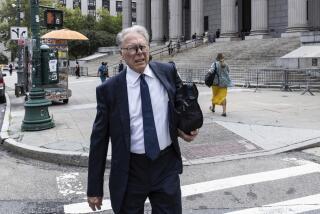Victory Spotlights Power, Strategy of NRA Lobbyists
- Share via
WASHINGTON — Tennessee Democrat Jim Cooper has always been a staunch backer of the National Rifle Assn. drive to loosen federal gun laws and during his 1984 election campaign the group gave him nearly the legal limit of $10,000 in contributions.
But last month, Cooper--a stickler for parliamentary procedure in the House--refused to join in an effort to send a controversial NRA gun bill straight to the floor, bypassing consideration by an unfriendly Judiciary Committee.
The group immediately fired off a letter to all of its members in his district charging that such an action as Cooper’s was “basically anti-gun” and outraged calls from NRA sympathizers started flooding into his office, the lawmaker said.
“I think that was a needless slam and indicative of their heavy-handed tactics on this issue,” Cooper charged. “ . . . I’ve probably ended my chances of ever getting money from the NRA even though I’ve only opposed them on one question.”
The incident illustrates the power and influence of the 3-million-member NRA, one of Washington’s most effective, well-financed and hard-nosed lobbying organizations.
“It has the Congress completely intimidated,” charged Sen. Edward M. Kennedy (D-Mass.), a strong opponent of NRA legislation passed by the House Thursday that would weaken weapons controls enacted after the 1968 murder of his brother, New York Sen. Robert F. Kennedy. “. . . They’ve got mimeograph machines and long memories.”
But supporters argue that the key to the NRA’s effectiveness is a broad base of support from members passionate about their right to own weapons. “When the President invaded Grenada I said, ‘that’s silly, we’ve got more armed people in Duluth than they have in Grenada’,” said Minnesota Democrat James L. Oberstar, a consistent supporter of NRA goals, even though he heads the liberally oriented Democratic Study Group.
Key to Effectiveness
NRA spokesman James Baker agreed that its broad base of support is the key to his organization’s effectiveness: “People believe in the right of law-abiding citizens to keep and bear arms. . . . If you don’t have the right to defend yourself and your family, what right do you really have?”
Formed in 1871 by military officers seeking to promote better civilian marksmanship, the NRA in recent years has become better known for its success in shooting down attempts to toughen gun controls and for its success in targetting campaigns of political opponents and sympathizers. Federal records show that the group’s political action committee took in more than $3.3 million in contributions during the 1984 campaign cycle, making it the 10th largest money raiser among all PACs.
The organization says it spent $1.6 million, much of it on media advertising and mass mailings, on its latest drive to loosen gun laws. Opponents claim the figure was much higher. But the key to its influence is not only the large amounts of money it rakes in but the way it spends it. NRA strategists regularly flood the membership of affiliated gun and sportsmen’s clubs around the country with mailings urging pressure on lawmakers.
‘Personal Contacts’
“It has one of the largest network organizations in the country and, unlike some other groups, their members respond to what they are asked to do,” said one aide to House Democrats. While congressmen regularly receive computer generated mass mailings from other lobbying groups, NRA-inspired letters usually come in handwritten, the aide explained. “They are personal contacts, not just a Xeroxed sheet, and that is very important,” he said.
NRA critics marvel at the group’s effectiveness, but also accuse it of heavy-handed and misleading tactics. For example, one advertisement the group placed in Time magazine to promote its gun bill claimed that 75% of persons charged by prosecutors with firearms violations were “law-abiding citizens.” Statistics for the last three years compiled by the federal Alcohol, Tobacco and Firearms Bureau indicated that nearly three-quarters of firearms cases it cited involved persons with previous records of firearms violations.
Rep. William J. Hughes (D-N.J.), who led House forces trying to stop the NRA bill, said he had been approached by at least 15 colleagues in recent days who apologized in advance for voting for a bill they knew was wrong. One red-faced lawmaker told Hughes that he could afford to ignore law enforcement groups which had fought vigorously to maintain strong gun laws, but he could not easily cross the NRA.
“The NRA never forgets,” Hughes recalled the legislator as telling him. “The police will forget. . . . It’s the fear and intimidation you’re battling.”
More to Read
Get the L.A. Times Politics newsletter
Deeply reported insights into legislation, politics and policy from Sacramento, Washington and beyond. In your inbox twice per week.
You may occasionally receive promotional content from the Los Angeles Times.









